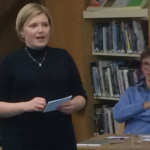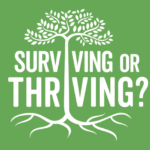Mr Routledge – ‘What makes me Tic’
‘What Makes Me Tic’
Good morning, everyone.
A really big thing happened in my life recently. It took exactly 1480 days, but it eventually happened. To put that another way, it took 211 weeks, or it took 35,520 hours, or it took 127,872,000 seconds, but eventually it did happen. Someone finally said what I suspect many had thought, but never dared to say…
“Sir, what’s going on with your face? Why do you blink so much?”
And there it was. Finally. After four years of teaching here at RHS, someone had finally popped their head above the parapet and asked the question. And it got me thinking about several things.
To get the actual question out of the way, the answer is quite simple and a lot more boring than people expect – I just can’t help it. It started when I was about 13 and never really went away. Yes – I know I do it, yes – I wish I could stop, I suppose. Yes – it comes and goes, mostly when I get tired, or stressed, but no – it does not upset me, or hurt, or get me down.
These are questions that I am used to being asked, if I am honest, and yet… it took over four years for someone to finally bring it up here at RHS.
So, what does this tell me? What did this moment make me think about?
Firstly, it made me consider the importance of questioning, and being brave enough to seek answers to things about which we are genuinely curious. Once the question was asked, there were a flurry of follow up questions from other pupils, but they were just too nervous to ask before. It took that one person to have the confidence to ask to allow others to follow up. But at the same time, who knows what my response could have been? Could I have gotten angry? Upset? It would be hard to predict – it’s clearly something quite personal. As a result, no one asked, even though it was something they wanted to know.
It is important that we have the confidence to question, to pursue answers to the things that we want to know, even if it takes us outside of our comfort zone. We cannot allow ourselves to become satisfied by just accepting whatever is told to us without looking to discover more. Ask the questions that you want answered. By doing this, we allow others the opportunity to question too, and we end up with a greater sense of inquiry and curiosity.
The second thing that this moment made me consider was my own approach to my blinking over the course of my life. At first, it was something that attracted a bit of attention – people at my school said some unkind things, and it was something that at first, I was desperate to try to control. I tried all kinds of things, which ultimately didn’t work. But this led me to the conclusion which I still have today – that I cannot try to control the things over which I have no control. Rather than try to control and stop it, I accept it as a part of me. I adapt and recognise it. I make jokes about it. The title of this Chapel talk is ‘What Makes Me Tic”. (That was a good pun – it deserved better. That point deserves reiterating in print).
 Tics, of varying severity, affect one in three adults.
Tics, of varying severity, affect one in three adults.
Ultimately, though, accepting that this is just something that my face does has made me a more reflective and, I would argue, stronger person. I could have allowed something so visual to be something that held me back; I could have tried to hide it away out of fear of being laughed at or talked about, but instead I accepted it as a part of me and did not try to hide it away. I did school plays and community theatre, I joined social clubs, and I entered a profession where I am effectively on display for my entire working day.
It is important that we recognise these things about ourselves and do not try to change the things we cannot. As a school, we encourage you to think, to reflect, and to make changes in all kinds of ways to best prepare you for the world out there. But at the same time, you must hold true to yourselves certain things which make up who you are. Do not try to change what makes you you, if you are not able. Once you accept yourself and are at peace with what you can control, making changes in the right areas becomes so much easier.
And finally, the last thing that this made me consider was what it was which prevented people at RHS from asking in the first place. It wasn’t fear. I’m not a scary person. It was, I like to think, politeness. Courtesy. An awareness that I could be offended or upset by being asked to talk about it. And this gives me real cause for optimism.
I strongly believe in the fundamental goodness of people. I believe that each of you in this room today is a fundamentally good person. You recognise that it is not nice to hurt people, that there are some things which people can’t control, and that to be treated with a degree of respect and fairness is the right way to live our lives. The fact that not once in a school of over 700 pupils, across 4 years, did anyone run the risk of hurting my feelings by asking about my tics, speaks volumes about the potential for good within this school. So, I challenge you, as a community, to build on this. Recognise the qualities that make you you. Be strong enough not to allow yourselves to be led by others. Recognise that, whether you realise it or not, you have great capacity for good in this world – and be the one to question and challenge when you see something that goes against the values you stand for. Be like that person who dared to ask me the question, but also remember the goodness that prevented others from asking.
Have a fantastic day.
I am a Contributor for the RHS Bubble















Post Comment
You must be logged in to post a comment.